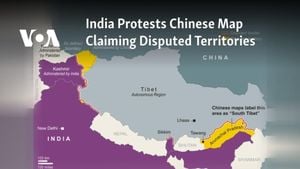The spotlight on former Prime Minister Thaksin Shinawatra’s recent hospital stay has intensified, with lawmakers launching an investigation to determine whether he received preferential treatment during his time at the Police General Hospital (PGH). This inquiry, spearheaded by the House committee on state security and related affairs, is set to look closely at the circumstances surrounding Thaksin’s extended medical leave, which has raised eyebrows across Thailand.
This week marks the start of the legislative inquiry, which will convene under the leadership of Rangsiman Rome, a member of the opposition People's Party. The discussions are expected to focus not just on individual cases of perceived justice system inequity, but also on broader reforms necessary to prevent preferential treatment from becoming commonplace.
The basis for this inquiry is rooted in a report released by the National Human Rights Commission (NHRC). That report, dated July 30, openly questioned the legality surrounding inmate medical transfers. It pointed out potential flaws within the existing regulations, which were initially drafted by former Justice Minister Somsak Thepsutin. The current rules allow corrections officials considerable discretion when it come to inmate transfers for medical reasons, effectively enabling potential abuses of power.
Thaksin’s hospital stay, which extended well beyond the standard maximum limit of 120 days, exemplifies the concerns raised by the NHRC. Initially sentenced to eight years for various charges upon his return to Thailand after 15 years of self-imposed exile, Thaksin was hospitalized for what officials labeled serious health issues. Upon his admission to PGH, he was reportedly suffering from several ailments including hypertension and low blood oxygen levels. Yet, the circumstances of his transfer and continued hospitalization pose serious questions about whether he was treated differently than other inmates, due to his high-profile status.
Further adding to the scrutiny surrounding Thaksin’s case is the involvement of the National Anti-Corruption Commission (NACC), which is conducting its examination of the entire situation. Their interest highlights not only the legal ramifications of Thaksin's hospitalization but also the potential for wider systemic issues within Thailand's corrections framework.
At the heart of the inquiry is the question of whether the regulations meant to govern inmate medical care are sufficient to prevent favoritism. The NHRC emphasized the significant regulatory loopholes currently permitting such speculation of inequity. According to their report, as long as the Corrections Department provides approval for medical transfers, the accountability mechanisms remain weak, with limited checks once the approval is granted.
During the committee hearings, key figures will be called to provide testimony, including high-ranking police officials and medical personnel who were directly involved with Thaksin’s care. This aims to paint a clearer picture of the processes and protocols followed during his hospital stay. Lawmakers are particularly interested in examining how recommendations for continued medical care were determined, what protocols were followed, and whether those align with best practices established for all inmates.
Notably, Thaksin has made headlines not just for alleged preferential treatment but also for his dramatic return to Thailand following his extended exile. Upon his arrival on August 22, 2022, the former prime minister received considerable media attention after being sentenced to prison, initially for eight years, which was later reduced to one year through royal clemency. His highly publicized transfer to PGH following complaints of chest pain and other health concerns prompted suspicion among the public and opposition politicians alike.
The committee's findings will be pivotal not just for Thaksin, but could serve to reshape how Thailand's justice system addresses inmate healthcare and treatment across the board. The public, already wary of perceived injustices within the system, is waiting with bated breath to see whether this inquiry will result in meaningful reforms.
Reform advocates argue the current situation suggests a glaring need for comprehensive changes to the corrections system, aiming for equality and justice for all individuals, irrespective of their status. The outcome of the inquiry could lay the groundwork for much-needed changes to how the system operates and how it engages with inmates seeking medical care.
This scrutiny arrives at a time when the Thai populace is particularly aware of inequalities within its justice system, sparked by high-profile cases and the general sentiment of disenfranchisement among various sectors of society. An investigation like this, especially one involving someone as notable as Thaksin, carries the potential to either reinforce existing prejudices or catalyze significant reform within the corrections system.
For Thaksin, the stakes are undeniably high. The former prime minister’s public image has oscillated between victimhood and privilege. While some view him as someone deserving of empathetic treatment due to his health issues, others suspect he might be wielding his resources and influence to navigate the system more favorably than his incarcerated peers. How the committee interprets these interactions and balances them against the backdrop of broader reforms will determine both the future of Thaksin's legacy and the integrity of Thailand's judicial process.
The investigation continues to evolve, and as the committee prepares for its upcoming meetings, the questions surrounding Thaksin's hospital stay are expected to remain at the forefront of public discussions. The outcomes of this inquiry could not only usher potential reforms within Thailand's detention system but also raise fundamental questions about accountability and equality before the law.
With pending testimonies from officials and medical personnel, expect more revelations as the committee dives deep, ensuring transparency and fairness become central tenets of the Thai correctional system.



